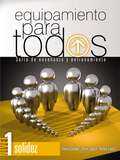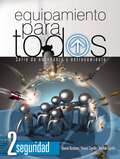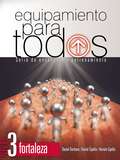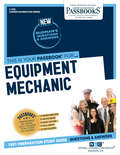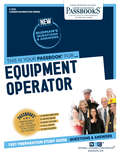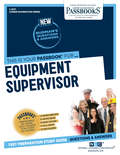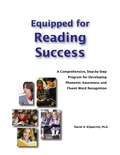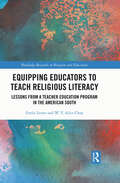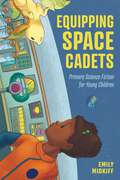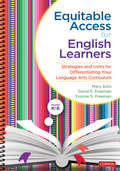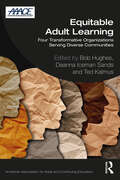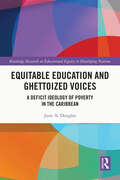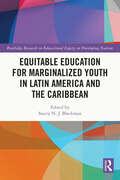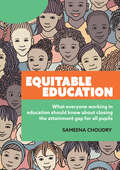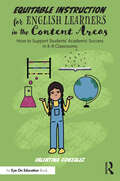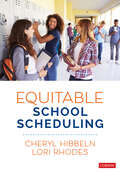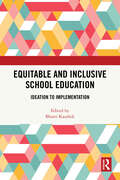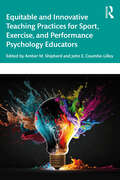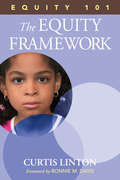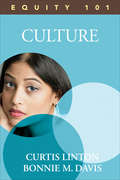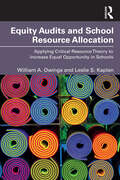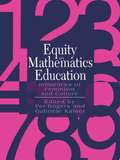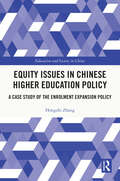- Table View
- List View
Equipamiento para todos – Nivel 1 Solidez: Serie de enseñanza y entrenamiento
by Daniel DardanoCuando un creyente se dispone a estudiar la Biblia, suele recurrir a comentarios bíblicos, con la finalidad de comprender adecuadamente las verdades divinas. Esta serie de enseñanza y entrenamiento, aunque podría ser considerada como de estudio bíblico, no es exactamente eso.Equipamiento para todos tiene el objetivo de que cada creyente sea transformado por la vida de Cristo que habita en él.Éste es el primer libro de la serie de enseñanza y entrenamiento, el cual contribuye a la solidez de los creyentes a través de temas como:Un discípulo según JesucristoExpresiones de una vida superiorLo consagrado al SeñorQuién es el mayor según JesúsEl estudio de los escritos bíblicos siempre ha sido importante para la Iglesia. De hecho, desde sus comienzos los creyentes perseveraron en aprender las Escrituras con diligencia y dedicación. Además, el Nuevo Testamento refleja la constante labor de los apóstoles, quienes se ocuparon de que las futuras generaciones recibieran un legado doctrinal caracterizado por la solidez.El conocimiento intelectual de las verdades de Dios nunca será suficiente y no debe ser la meta del creyente. El objetivo del Señor es que cada uno de sus hijos experimente y viva en plenitud lo revelado en la Palabra. Cuando esto ocurre, los demás pueden comprobar que esas verdades son efectivas en la vida diaria.Este libro es un recurso valioso y los principios desarrollados en su contenido tienen el poder de transformar tu vida. Equipping for Everyone – Level 1 Solidity When a believer sets out to study the Bible, he or she often turns to a Bible commentary or a theology manual. However, even if it seems that this series of teachings is just that, it is not so. Equipping for Everyone is designed to help each believer to be transformed by the life of Christ that dwells within them. This is the first book in a series of teachings that seeks to strengthen the believer through topics such as:A disciple according to Jesus ChristSigns of a superior lifeWhat is consecrated to the LordWho is the greatest according to JesusThe study of the biblical text has always been important for the Church. In fact, from the Church&’s conception the believers have persevered in studying the Scriptures with diligence and dedication. In addition, the New Testament reflects the constant work of the apostles, who sought to provide for future generations a legacy characterized by its solidity.It will never be sufficient to know the truths of God intellectually, and this should not be a believer's objective in studying the Scriptures. On the contrary, it is the Lord's will that each one of His children experience and live out the fullness of the truths revealed in the Word. When this happens, others will see that these truths have become part of the believer&’s everyday life. This book is a valuable resource, teaching principles that have the power to transform your life.
Equipamiento para todos – Nivel 2 Seguridad: Serie de enseñanza y entrenamiento
by Daniel Dardano Daniel Cipolla Hernán CipollaTodas las palabras tienen un significado que las define. Sin embargo, suelen estar sujetas a la interpretación de las personas. Cuando se las analiza de manera superficial o se las adapta a conceptos contemporáneos y culturales, corren el riesgo de perder su sentido original y su dimensión. Algunos pocos ejemplos lo demuestran. Iglesia es una palabra que se suele usar para referirse a toda clase de sistema religioso que dictamina las reglas de vida que las personas deben seguir. Reino es una palabra que se suele asociar a la grandeza de un monarca, a quien se lo considera casi como el dueño del país al que representa. Autoridad es una palabra que se relaciona con orden y justicia, o abuso y corrupción. El hecho es que estas tres palabras se interpretaron de maneras tan variadas según la época, que muchas veces su significado real se tergiversó.En la actualidad, ¿cómo interpretan los cristianos las palabras iglesia, reino y autoridad? ¿Las comprenden desde un punto de vista cultural, religioso, tradicional o popular? Sin duda, la única manera de percibir estas palabras y lo que ellas representan en la dimensión correcta es verlas como Dios las ve; y los creyentes tienen ese privilegio.Iglesia, Reino y autoridad, son los tres grandes temas tratados en Equipamiento para todos, Nivel 2, Seguridad. Independientemente de los conceptos erróneos que hayan existido, es imprescindible establecer lo que Dios dice acerca de estos temas de tanta relevancia.Este libro presenta una perspectiva espiritual reveladora que elevará tu mirada. Ver la Iglesia, el Reino y la autoridad como el Señor lo hace, traerá seguridad a tu vida.Equipping for Everyone – Level 2 SecurityAll words have a meaning that defines them. However, they are often subject to people's interpretation. When they are superficially analyzed or adapted to contemporary and cultural concepts, they run the risk of losing their original meaning and dimension. A few examples prove it. Church is a word that is often used to refer to all kinds of religious system that dictates the rules of life that people must follow. Kingdom is a word that is usually associated with the greatness of a monarch, who is considered almost as the owner of the country he represents. Authority is a word that relates to order and justice, or abuse and corruption. The fact is that these three words were interpreted in such varied ways according to the time, that many times their real meaning was misrepresented.Today, how do Christians interpret the words church, kingdom, and authority? Do they understand them from a cultural, religious, traditional, or popular point of view? Without a doubt, the only way to perceive these words and what they represent in the correct dimension is to see them as God sees them; and believers have that privilege.Church, Kingdom, and authority are the three main topics covered in Equipment for all, Level 2, Security. Regardless of the misconceptions that may have existed, it is imperative to establish what God says about these important issues.This book presents an eye-opening spiritual perspective that will lift your gaze. Seeing the Church, the Kingdom and authority as the Lord does, will bring security to your life.
Equipamiento para todos – Nivel 3 Fortaleza: Serie de enseñanza y entrenamiento
by Daniel Dardano Daniel Cipolla Hernán CipollaUna persona débil físicamente tiene un mayor riesgo de contraer enfermedades. En cambio, un organismo saludable tiene una fortaleza que refleja su vitalidad interior.De la misma manera, los creyentes en Cristo pueden estar débiles espiritualmente o mostrar una fortaleza interior que los hace altamente resistentes. ¿De dónde nace la fortaleza espiritual? Sin dudas, de la presencia del Espíritu Santo en cada cristiano.En una vida llena del Espíritu no puede prosperar ningún conflicto espiritual, como tampoco el pecado o la influencia del diablo. En realidad, la plenitud del Espíritu manifiesta la victoria en todas las áreas. Además, evidencia el poder sobrenatural para hacer las obras que Dios preparó para sus hijos que, según Jesús lo expresó, en muchos casos serían mayores a las que Él mismo realizó. Todo esto proviene de la fortaleza del Espíritu Santo en el creyente.Este libro es sobre el Espíritu Santo. Sin embargo, ¿es posible enseñar algo nuevo acerca del Espíritu que no se haya dicho aún? Verás que siempre hay más del Espíritu Santo que es posible aprender. Pero sobre todas las cosas, percibirás que la fortaleza de los hijos de Dios proviene del Espíritu Santo.Este libro tiene el objetivo de presentar la centralidad del Espíritu Santo en la vida del creyente y de la Iglesia.Equipping for Everyone – Level 3 StrengthA physically weak person has a higher risk of contracting diseases. In contrast, a healthy body has a strength that reflects its inner vitality.In the same way, believers in Christ can be spiritually weak or show an inner strength that makes them highly resistant. Where does spiritual strength come from? Undoubtedly, of the presence of the Holy Spirit in each Christian.In a Spirit-filled life, no spiritual conflict can flourish, nor can sin or the influence of the devil. In reality, the fullness of the Spirit manifests victory in all areas. In addition, it evidences the supernatural power to do the works that God prepared for his children, which, according to Jesus expressed it, in many cases would be greater than those that He himself performed. All of this comes from the strength of the Holy Spirit in the believer.This book is about the Holy Spirit. However, is it possible to teach something new about the Spirit that has not yet been said? You will see that there is always more of the Holy Spirit that is possible to learn. But above all things, you will perceive that the strength of God's children comes from the Holy Spirit.This book has the objective of presenting the centrality of the Holy Spirit in the life of the believer and of the Church.
Equipment Mechanic: Passbooks Study Guide (Career Examination Series #C-1608)
by National Learning CorporationThe Equipment Mechanic Passbook® prepares you for your test by allowing you to take practice exams in the subjects you need to study. It provides hundreds of questions and answers in the areas that will likely be covered on your upcoming exam, including but not limited to: mechanical components and principles; electrical theory and cooling and heating systems; test, diagnose, and repair vehicle electric systems and accessories; components of combustion engines; vehicle and equipment operation and components; and more.
Equipment Operator: Passbooks Study Guide (Career Examination Series)
by National Learning CorporationThe Equipment Operator Passbook® prepares you for your test by allowing you to take practice exams in the subjects you need to study. It provides hundreds of questions and answers in the areas that will likely be covered on your upcoming exam, including but not limited to: operation and maintenance of heavy equipment; tools and their uses; arithmetical computation and reasoning; and other related areas.
Equipment Supervisor: Passbooks Study Guide (Career Examination Series #C-3546-9)
by National Learning CorporationThe Equipment Supervisor Passbook® prepares you for your test by allowing you to take practice exams in the subjects you need to study. It provides hundreds of questions and answers in the areas that will likely be covered on your upcoming exam, including but not limited to: highways, drainage facilities, related structures, and snow and ice control; operation and preventative maintenance of automobiles, trucks and heavy equipment; safety practices; supervision; mechanical devices and tools used in maintenance work; and other related areas.
Equipped For Reading Success: A Comprehensive, Step-by-step Program For Developing Phonemic Awareness And Fluent Word Recognition
by David KilpatrickMore than an explanation of current research, Equipped for Reading Success is a complete program for training phonemic awareness. Research has shown that contrary to our intuitions, phonemic awareness is important for remembering the words we read (sight-word recognition), not just for developing phonic decoding skills. Equipped for Reading Success uses a developmentally appropriate approach designed to boost phonemic awareness, phonics, and instant word recognition. It also gives teachers concrete tools to help children develop a large sight vocabulary and is designed to supplement any existing reading program or approach. Implementing the program requires minimal planning and only several minutes of supplemental instruction per day.
Equipping Educators to Teach Religious Literacy: Lessons from a Teacher Education Program in the American South (Routledge Research in Religion and Education)
by Emile Lester W. Y. ChanThis volume provides a detailed evaluation of a unique education program implemented in secondary schools in Georgia to enhance teachers’ religious literacy and their ability to promote this in schools and classrooms. The text demonstrates that religious literacy can be proactively taught to students, whilst also highlighting key considerations and tensions around religious liberty in the American South. Spanning rural, urban, and suburban Georgia, the text presents an original approach to the growing field of religious literacy by foregrounding community voices and perspectives. Using rich empirical data and qualitative interviews with religious and political leaders, scholars, teachers, parents, and students, the book evaluates the challenges, efficacy, and benefits of the program in view of rising political polarization. In doing so, the text tackles historical and contemporary issues around race and religion, and considers tensions between religious and nonreligious groups in the US. Ultimately, the book presents a significant contribution to the dialogue around fostering religious literacy in schools. This text will benefit researchers, academics, and educators with an interest in religious education, teacher education, and religious literacy more broadly. Those interested in the sociology of education, as well as diversity and religion in America, will also benefit from this volume.
Equipping Space Cadets: Primary Science Fiction for Young Children (Children's Literature Association Series)
by Emily MidkiffWinner of the 2023 Science Fiction Research Association (SFRA) Book Award2022 Longlist Nominee for the Best Non-Fiction Award from the British Science Fiction AssociationEquipping Space Cadets: Primary Science Fiction for Young Children argues for the benefits and potential of “primary science fiction,” or science fiction for children under twelve years old. Science fiction for children is often disregarded due to common misconceptions of childhood. When children are culturally portrayed as natural and simple, they seem like a poor audience for the complex scientific questions brought up by the best science fiction. The books and the children who read them tell another story. Using three empirical studies and over 350 children’s books including If I Had a Robot Dog, Bugs in Space, and Commander Toad in Space, Equipping Space Cadets presents interdisciplinary evidence that science fiction and children are compatible after all. Primary science fiction literature includes many high-quality books that cleverly utilize the features of children’s literature formats in order to fit large science fiction questions into small packages. In the best of these books, authors make science fiction questions accessible and relevant to children of various reading levels and from diverse backgrounds and identities. Equipping Space Cadets does not stop with literary analysis, but also presents the voices of real children and practitioners. The book features three studies: a survey of teachers and librarians, quantitative analysis of lending records from school libraries across the United States, and coded read-aloud sessions with elementary school students. The results reveal how children are interested in and capable of reading science fiction, but it is the adults, including the most well-intentioned librarians and teachers, who hinder children's engagement with the genre due to their own preconceptions about the genre and children.
Equitable Access for English Learners, Grades K-6: Strategies and Units for Differentiating Your Language Arts Curriculum
by Yvonne S. Freeman David E. Freeman Mary SotoPlain and simple: until our English learners have equitable access to the curriculum, they’ll continue to struggle with subject area content. And if you’re relying on add-on’s to fit in from your language arts basal or a supplementary program, Mary Soto, David Freeman, and Yvonne Freeman are here to equip you with much more effective, efficient, and engaging strategies for helping your English learners read and write at grade level. One assurance right from the start: Mary, David, and Yvonne are not suggesting you reinvent your curriculum. Instead, Equitable Access for English Learners, Grades K-6, focuses on how to fortify foundational practices already in place. First, you’ll learn more about the Equitable Access Approach, then it’s time to dive into the book’s four units of study. Drawing on each unit’s many strategies, you’ll discover how to apply them to any unit in your own language arts curriculum and start differentiating: How to draft and implement language objectives to help English learners meet academic content standards How to make instructional input comprehensible, including translanguaging strategies that draw on your students’ first languages when you don’t know how to speak them How to utilize the characteristics of text to support readers, along with a rubric for determining a text’s cultural relevance How to build students’ academic content knowledge and develop academic language proficiency Each unit addresses a commonly taught topic in today’s language arts programs and comes with ready-to-go review and preview activities, key strategies, grade-level adaptations, reflection exercises, and printable online resources. Taken as a whole, they constitute an all-new approach for providing that equitable and excellent access our English learners so rightfully deserve. "When you adopt our Equitable Access Approach, your students will not only thrive, they’ll also find your language arts curriculum much more meaningful and engaging." —Mary Soto, David E. Freeman, and Yvonne S. Freeman
Equitable Access for English Learners, Grades K-6: Strategies and Units for Differentiating Your Language Arts Curriculum
by Yvonne S. Freeman David E. Freeman Mary SotoPlain and simple: until our English learners have equitable access to the curriculum, they’ll continue to struggle with subject area content. And if you’re relying on add-on’s to fit in from your language arts basal or a supplementary program, Mary Soto, David Freeman, and Yvonne Freeman are here to equip you with much more effective, efficient, and engaging strategies for helping your English learners read and write at grade level. One assurance right from the start: Mary, David, and Yvonne are not suggesting you reinvent your curriculum. Instead, Equitable Access for English Learners, Grades K-6, focuses on how to fortify foundational practices already in place. First, you’ll learn more about the Equitable Access Approach, then it’s time to dive into the book’s four units of study. Drawing on each unit’s many strategies, you’ll discover how to apply them to any unit in your own language arts curriculum and start differentiating: How to draft and implement language objectives to help English learners meet academic content standards How to make instructional input comprehensible, including translanguaging strategies that draw on your students’ first languages when you don’t know how to speak them How to utilize the characteristics of text to support readers, along with a rubric for determining a text’s cultural relevance How to build students’ academic content knowledge and develop academic language proficiency Each unit addresses a commonly taught topic in today’s language arts programs and comes with ready-to-go review and preview activities, key strategies, grade-level adaptations, reflection exercises, and printable online resources. Taken as a whole, they constitute an all-new approach for providing that equitable and excellent access our English learners so rightfully deserve. "When you adopt our Equitable Access Approach, your students will not only thrive, they’ll also find your language arts curriculum much more meaningful and engaging." —Mary Soto, David E. Freeman, and Yvonne S. Freeman
Equitable Adult Learning: Four Transformative Organizations Serving Diverse Communities (American Association for Adult and Continuing Education)
by Bob Hughes Deanna Iceman Sands Ted KalmusThis book provides case studies written by practitioners from four organizations serving diverse adult learners in equitable, inclusive, and just ways. Their work employs an adapted version of the Education Deans for Justice and Equity Framework for Assessment and Transformation, a comprehensive tool grounded in research on equity and justice. This is one of the first published uses of that framework. The editors situate this book in the history and need for increased equity and justice in adult education. They apply participatory action research to assist the four organizations in telling their stories. Authors of the organization chapters highlight their history and context in relation to their organizational structures, systems, policies, and procedures. Editors provide a cross-case analysis of the four case studies. This book will appeal to academics in adult education, social justice education, qualitative research methods, and organizational development. Organizations and practitioners will find exemplars of how to live into their intentions to be equitable and just.
Equitable Education and Ghettoized Voices: A Deficit Ideology of Poverty in The Caribbean (Routledge Research on Educational Equity in Developing Nations)
by June A. DouglasThis book centres the voices of a group of marginalized residents in Grenada’s ghetto to examine questions of poverty and survival and how, within this context, residents are able to focus on improvement and equity for their children through education.As a developing nation in the Caribbean influenced by both its British colonial past and its proximity to the United States, Grenada is still rife with poverty, and access to quality education is limited. The author examines this tradition of the ghetto as the centre of community and a force for positivity among youth, and develops a theory of education and deficit poverty through examples of citizens living in a developing state. Using functionalism, life course, and other systems theories, the book examines how institutions can support communities, and, in contrast, how families in poverty support themselves in the wake of system failure, to the extent that some children become successful university graduates, entrepreneurs, and world travellers. A cutting analysis of the development of equity through education in states left behind by colonialism and globalisation, this book offers new understandings of survival and criminality caused by deficit poverty. It will appeal to scholars, faculty, and researchers with interests in international education, education and globalisation, small island states, life course theory, systems theory, and anthropology.
Equitable Education for Marginalized Youth in Latin America and the Caribbean (Routledge Research on Educational Equity in Developing Nations)
by Stacey N. J. BlackmanThis edited volume examines the thrust towards equity in education for marginalized and out-of-school youth, as well as youth with disabilities, in countries located in the Global South. Using a critical cross-cultural lens to interrogate the historical, empirical, and theoretical discourses associated with achieving UNESCO’s equity in education agenda, the book showcases the work of scholars from developed and developing nations in examining inclusive education. Drawing attention to the nature, impact, and effects of marginalization, the book ultimately demonstrates the ability of education systems in the Global South to be innovative and agile despite current resource challenges. This text will benefit scholars, academics, and students in the fields of international and comparative education, education policy, and inclusion and special educational needs education more broadly. Those involved with Caribbean and Latin American studies, the sociology of education, and diaspora studies in general will also benefit from this volume.
Equitable Education: What everyone working in education should know about closing the attainment gap for all pupils
by Sameena ChoudryNever has a book on social justice and equitable education been so relevant.Recent events have highlighted the huge attainment gaps that exist for many pupils within the education system due to factors outside of their control. As the diversity of the pupil population increases, it is more important than ever to develop the skills, knowledge and understanding within the teaching profession around issues of equality and inclusion. This book provides trainees and teachers with an in-depth understanding of the complex issues related to the attainment of key groups of disadvantaged pupils, and practical strategies that can be deployed to address these gaps.Chapters focus on: social class, gender, English as an additional language, minority ethnic achievement, gypsy, Roma and travellers, refugee and asylum seekers, and those with special educational needs and disabilities. The book takes a stark look at the evidence and statistics, provides an overview of the key issues and considerations for each particular group, and suggests key resources and examples of good practice, along with case studies and points for reflection. Ultimately it encourages you to have high expectations of your pupils and to truly believe that you can help them realise their ambitions and aspirations. This is a powerful and timely consideration of the ways in which education has the capacity to make a difference. Packed full of evidence-informed strategies, this book considers the range of ways that schools can respond positively to build far greater equity for all…Sameena Choudry's contribution is authoritative and compelling and deserves our full attention.Dame Alison Peacock.
Equitable Instruction for English Learners in the Content Areas: How to Support Students’ Academic Success in K-8 Classrooms
by Valentina GonzalezIn Equitable Instruction for English Learners in the Content Areas, ESL expert Valentina Gonzalez shows you how to meet the needs of English learners in K-8 classrooms. With an emphasis on comprehensible input, the clear and accessible guidance in this book allows teachers to maintain a high level of instruction and hold all students to high standards while allowing English learners important opportunities to engage with key content area language and excel at subject-specific material. Demonstrating how equity is an essential component to teaching multilingual learners, this book includes engaging practical strategies catered to different grade levels, and it is essential reading for every teacher who works with multilingual learners.
Equitable School Scheduling
by Cheryl Hibbeln Lori RhodesTo understand a school’s values and priorities, look at its schedule. When schedules do not meet the instructional needs of students, the result is a pipeline from PreK through grade 12 that leaks students, an outcome disproportionately experienced by students of color and other marginalized student groups. This practical and thoughtful guide demonstrates how school and district scheduling teams can become "Architects of Equity"—highly effective teams who design schedules that reflect their commitment to student achievement and social-emotional wellbeing. Including strategies to shift collective mindsets around scheduling, organize and support teaching teams, and ensure fiscal responsibility in scheduling, Equitable School Scheduling is a vital resource for secondary school leaders committed to dismantling systemic inequities inherent in school structures. Readers will learn how to Self-assess site and/or district data through a deep examination of the course of study, site schedule(s), transcripts, and graduation cohort outcomes. Design and implement an Equitable Core—a guaranteed set of courses that all students experience as a part of a meaningful graduation. Prioritize underestimated and historically underserved students in the planning of the schedule. Equitable School Scheduling helps school and district administrators use scheduling as a tool to transform the leaky pipeline to graduation into a meaningful path to post-secondary success for all students.
Equitable School Scheduling
by Cheryl Hibbeln Lori RhodesTo understand a school’s values and priorities, look at its schedule. When schedules do not meet the instructional needs of students, the result is a pipeline from PreK through grade 12 that leaks students, an outcome disproportionately experienced by students of color and other marginalized student groups. This practical and thoughtful guide demonstrates how school and district scheduling teams can become "Architects of Equity"—highly effective teams who design schedules that reflect their commitment to student achievement and social-emotional wellbeing. Including strategies to shift collective mindsets around scheduling, organize and support teaching teams, and ensure fiscal responsibility in scheduling, Equitable School Scheduling is a vital resource for secondary school leaders committed to dismantling systemic inequities inherent in school structures. Readers will learn how to Self-assess site and/or district data through a deep examination of the course of study, site schedule(s), transcripts, and graduation cohort outcomes. Design and implement an Equitable Core—a guaranteed set of courses that all students experience as a part of a meaningful graduation. Prioritize underestimated and historically underserved students in the planning of the schedule. Equitable School Scheduling helps school and district administrators use scheduling as a tool to transform the leaky pipeline to graduation into a meaningful path to post-secondary success for all students.
Equitable and Inclusive School Education: Ideation to Implementation
by Bharti KaushikThis book highlights the strategies and approaches to the practice of equitable and inclusive school education, elaborating the role of various stakeholders such as teachers, special educators, parents, peers, teacher educators, educational administrators and Ed-tech firms.The aim of this book is to create an understanding of equitable and inclusive school education which is not restricted to children with disabilities but also includes children with different learning needs as well as those from socially and economically disadvantaged sections of society. The focus is on presenting practical strategies that are grounded in theory and supported with research. The significance of screening at the classroom level, development of need-based accessible learning teaching materials, customizing the pedagogy practices for inclusive classrooms, need-based examination accommodations, leveraging the potential of Information and Communication Technology (ICT) to elicit the participation of all and collaborative efforts toward realizing the optimum potential of each learner are a few basic ideas illustrated in the book with examples. The volume also discusses recent national and international policies for equitable and inclusive education, recommending courses of action for effective implementation of the existing provisions by teachers and educators.The book will be useful to students, researchers, teacher-educators, special educators, special education teacher educators, pre-service teachers and parents. It will also be an invaluable companion to in-service teachers, policymakers and educational administrators, curriculum developers and NGOs working in the field of inclusive education.
Equitable and Innovative Teaching Practices for Sport, Exercise, and Performance Psychology Educators
by Amber M Shipherd Coumbe-Lilley, John EEquitable and Innovative Teaching Practices for Sport, Exercise, and Performance Psychology Educators addresses the need for a resource on practical learning and assessment activities for face-to-face and online instruction in sport, exercise, and performance psychology. Specifically, this book provides readers with evidence-based strategies for addressing classroom challenges, namely those that the COVID-19 pandemic brought to the forefront, including flexible yet equitable teaching practices, student engagement both in and outside of the classroom, building connections in the online or hybrid classroom, and innovative techniques, activities, assessments, and course design approaches. The sport, exercise, and performance psychology field demands that educators help learners translate evidence into practice and recognize relationships between science, application, and reflection. Tomorrow’s learners will require instructional approaches that engage them and increase their awareness, knowledge, and skill development so that their experience is rich, deep, and memorable.Equitable and Innovative Teaching Practices for Sport, Exercise, and Performance Psychology Educators bridges the gap between pre- and post-pandemic teaching and learning practices that provide educators with strategies and tools to equip them for tomorrow’s students and is key reading for graduate students, young professionals, or experienced educators in the field of sport, exercise, and performance psychology. Active professionals in the broader fields of psychology, kinesiology, coaching, counselling, or education who may teach sport, exercise, and performance psychology courses or students will also find this new book a valuable resource.
Equity 101- The Equity Framework: Book 1
by Curtis W. LintonEquity is key to eliminating achievement gaps This first volume of a four-book series outlines a simple, yet powerful approach to creating the expectations, rigor, relevancy, and relationships necessary for any child to succeed. Equity 101 describes school systems that have changed their climate, culture, and practices to foster high levels of achievement. Best-selling author Curtis Linton introduces the three essential characteristics of equity: Clear expectations for closing the achievement gap Commitment to rigorous curriculum Relationships that promote learning Readers will have access to online videos that are keyed to central concepts of the series.
Equity 101: Book 2
by Curtis W. Linton Bonnie M. DavisHelp a culture of equity grow and thrive in your school! This second book in the groundbreaking Equity 101 series takes on the cultures we come from and the culture we foster in our schools. When diversity is the norm, how do we create an equitable culture where everyone succeeds? Your path starts with increasing educators’ cultural competency, overcoming institutionalized factors that limit achievement, and implementing equitable practices that ensure individualized support for all students. Resources include: Real-life success stories to use as models Chapter-specific implementation exercises that take you from ideas to action A dedicated online community for professional support
Equity Audits and School Resource Allocation: Applying Critical Resource Theory to Increase Equal Opportunity in Schools
by Leslie S. Kaplan William A. OwingsEquity Audits and School Resource Allocation explores how to apply Critical Resource Theory (CReT) to conduct school equity audits, ultimately preparing educational leaders to find equity disparities, engage in more equitable resource allocation in their schools, and improve equal educational opportunity for every student. With case study scenarios woven throughout the book, the authors explore key equity factors, including per-pupil expenditures, poverty, teacher and principal quality, program equity, and achievement equity. They also walk through the process of implementing the 5-step CReT equity audit within a school district or school at any level. Owings and Kaplan also describe the communication and interpersonal factors that equity advocates will need to leverage to gain community support for equity process, considering the data, and rethinking their policies and practices. In today’s education context, the problems of equitably funding public schools and allocating learning resources to generate more equal opportunities and higher outcomes for traditionally underserved children are particularly relevant. This important book is designed for course use in leadership preparation programs, for practicing principals and superintendents, and for educational leadership scholars.
Equity In Mathematics Education: Influences Of Feminism And Culture
by Gabriele KaiserThis text provides a critical overview of current thinking about equity issues in the teaching and learning of mathematics. Grounded in feminist theories of curriculum change and a broad range of cultural perspectives, the new approaches described here go beyond "special programmes" and "experimental treatments" designed to correct perceived problems and deficits. Instead they establish how improved instructional practices and a fuller understanding of the nature of the mathematical enterprise can overcome the systemic obstacles that have thwarted women's participation in this important field.; This book will appeal to all those who are interested in the mathematical education of women, including teachers, parents, administrators and researchers.
Equity Issues in Chinese Higher Education Policy: A Case Study of the Enrolment Expansion Policy (ISSN)
by Hongzhi ZhangInvestigating the highly influential enrolment expansion policy in Chinese higher education, this book outlines how educational equity issues were understood and addressed in the formulation and implementation of the policy, and its impacts on the socio-economic fabric of China in the past decades.Drawing on Chinese policy documents and interviews with government and university representatives, Zhang examines the education system under the Mao era and the post-Mao era and outlines the different approaches to equity that have characterized education in China in the 20th and 21st centuries. Stephen Ball’s "policy cycle" is used as a framework to analyse the various contexts (text, discourse, and social practice) in which policy is formed. Zhang argues that education policy was not simply driven by concerns of equity but also by economic interests and political discourse. Zhang further goes on to analyse how education policy was implemented by provincial governments and highlights the tension between central policy and on-the-ground implementation.Bringing analysis of Chinese policy and research to a wider audience, this text will interest education policymakers and academics in the field of educational equity and higher education research.
